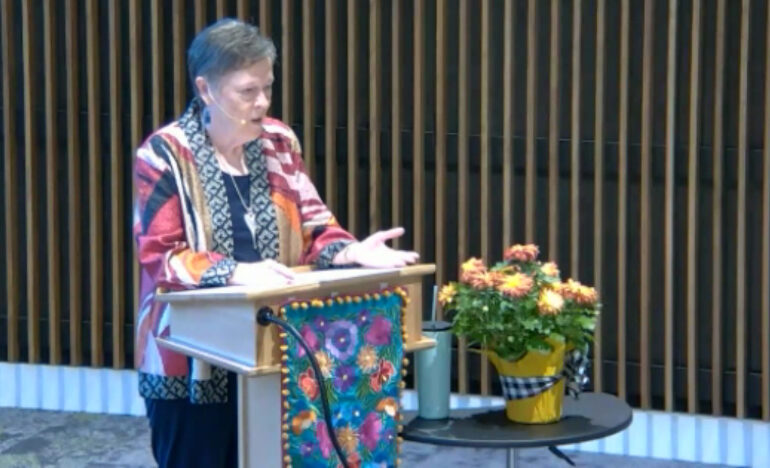A Summons to Nonviolence: Teachings of Jesus and the Buddha

By Kathy Keary
Part 2. Read all the parts here.
Last week the world witnessed and condemned the horrific insurrection that bloodied our nation’s Capitol. Many were dismayed questioning how this gross act of violence could take place in our treasured land. Undoubtedly, domestic terrorism is frightening. Unease looms over the country as continued unrest is threatened.
Nonviolence is a central theme in both the teachings of Jesus and the Buddha suggesting that they were well aware of the propensity to hatred and violence that would haunt humanity in all ages. Marcus Borg in his book, Jesus and Buddha: The Parallel Sayings, highlights well-known passages spoken by each contemplative that mirror one another promoting a life of love and non-violence. Examples follow:
Jesus: “This is my commandment, that you love one another as I have loved you” (John 15:12).
Buddha: “Just as a mother would protect her only child at the risk of her own life, even so, cultivate a boundless heart towards all beings. Let your thoughts of boundless love pervade the whole world” (Sutta Nipata [scripture] 149-150).
Jesus: “Do to others as you would have them do to you” (Luke 6:31).
Buddha: “Consider others as yourself” (Dhammapada [scripture] 10.1).
Jesus: “If anyone strikes you on the cheek, offer the other also” (Luke 6:29).
Buddha: “If anyone should give you a blow with his hand, with a stick, or with a knife, you should abandon any desires and utter no evil words” (Majjhima Nikaya [scripture] 21.6).
Jesus: “Love your enemies, do good to those who hate you, pray for those who abuse you. From anyone who takes away your coat do not withhold even your shirt. Give to everyone who begs from you; and if anyone takes away your goods, do not ask for them again” (Luke 6:27 – 30).
Buddha: “Hatreds do not ever cease in this world by hating, but by love; this is an eternal truth… Overcome anger by love, overcome evil by good. Overcome the miser by giving, overcome the liar by truth” (Dhammapada 1.5 & 17.3).
Jesus: “Put your sword back into its place, for all those who take the sword will perish by the sword” (Matthew 26.52).
Buddha: “Abandoning the taking of life, the ascetic Gautama [Buddha] dwells refraining from taking life, without stick or sword” (Digha Nikaya [scripture] 1.1.8).
Note: Never miss an article published on the Renewal Center website: Sign up to receive our newsletters
Nonviolence should not be confused with pacificism. Both Christianity and Buddhism teach the importance of nurturing our inner world. In doing so, we will be propelled into society to engage in concrete acts of love. Both faiths promote equally “being” and “doing.” John Dear, a Catholic priest and peace activist states in his book, The Nonviolent Life:
Practicing nonviolence means claiming our fundamental identity as the beloved sons and daughters of the God of peace, and thus, going forth into the world of war as peacemakers to love every other human being. We do that because we know who we are and we act as if we are truly God’s beloved sons and daughters. This is what Jesus taught: ”Blessed are the peacemakers; they shall be called the sons and daughters of God…Love your enemies and pray for your persecutors, then you shall be sons and daughters of this God who makes his sun rise on the good and the bad, and causes rain to fall on the just and the unjust.”
Thich Nhat Hahn, a respected Buddhist monk, states in his book, Peace is Every Step: A Path of Mindfulness in Everyday Life:
Practicing mindfulness in each moment of our daily lives, we can cultivate our own peace. With clarity, determination, and patience – the fruits of meditation – we can sustain a life of action and be real instruments of peace. I have seen this peace in people of various religions and cultural backgrounds who spend their time and energy protecting the weak, struggling for social justice, lessening the disparity between rich and poor, stopping the arms race, fighting against discrimination, and watering the trees of love and understanding throughout the world.
This merely scratches the surface of how Jesus and Buddha addressed violence and hatred. Next week we will continue to explore the topic of nonviolence in the Christian and Buddhist traditions.
New articles in this series are posted to the website every Monday. The full series can be found here: An Invitation to Something New: The Contemplative Life. On Thursday’s we’ll send an email to remind you of the articles.
Read Kathy Keary’s article “Maintaining the Contemplative Life in a Divided World.”
In the meantime, let us pray for peace in our land, for love to reign in our world, for a greater understanding among cultures, races, faiths, and ideologies, and for the light of Christ to break through the darkness.
May we hold in prayer not only the victims of this horrendous violence and their families but also the perpetrators that they may be touched by the transforming grace of God. As individuals and communities, may we engage in the practices that soothe our souls sending us into the world to be beacons of peace and nonviolence within our realm of influence.
References
Borg, Marcus. Jesus and Buddha: The Parallel Sayings. Berkley, California: Ulysses Press, 2004.
Dear, John. The Nonviolent Life. Long Beach, California: Pace e Bene Press, 2013.
Hahn, Thich Nhat. Peace is Every Step: The Path of Mindfulness in Everyday Life. New York: Bantam Books, 1991.
[Kathy Keary, a Precious Blood Companion and spiritual director, holds a master’s degree in theological studies and is a graduate of the Atchison Benedictine’s Sophia Center’s Souljourners Program, an intense study of spirituality and spiritual direction. Kathy believes that the divine is present and active in all of life and encourages others to be awakened to the God in all including the divine within. She enjoys accompanying others on their journey to wholeness discovering the person they were created to be.]
Top image is “Capitol Stormed Jan 6” (CC BY-NC 2.0) Some rights reserved by Blinkofanaye
We’d Like to Hear From You!
We’d like to know what you think about our The Contemplative Life Series. Send us a comment using the form below. Do you have a suggestion? Is there something you want to learn more about? Send us a note.
Related

Discover Lectio Divina
Presented by Kathy Keary
This is a recording of “Discover Lectio Divina” presented by Kathy Keary at Precious Blood Renewal Center in Liberty, Missouri, on Oct. 2, 2025.

Do You Hear What I Hear?
By Fr. Garry Richmeier, C.PP.S.
How can we avoid the harmful affects of the polarization that characterizes so much of our lives these days? One step toward this end is to cultivate a greater understanding and appreciation for the idea of relativity in human behavior.
Categories
Assembling God's Puzzle Coffee with Padre Cooking & Spirituality Encounters of the 4th Kind Family Matters Guided Meditations Reflections on the Eucharsitic Prayers Spiritual Resources Taize Prayers Teach Us to Pray The Contemplative Life Traveling with Pilgrims of Hope Uncategorized Videos Week of Prayer for Christian Unity When you need a little help
